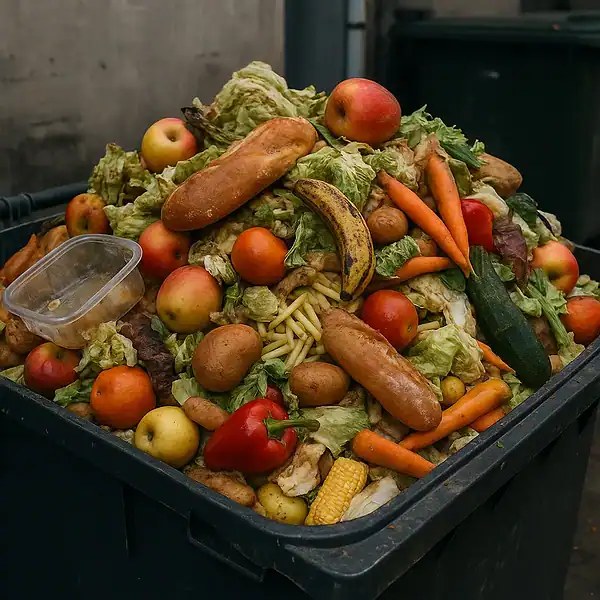Every year, billions of tonnes of food go uneaten while millions of people still face hunger. This blog explores the shocking truth about global food waste — how much food is wasted globally, why it happens, and what we can do here in Australia to make a real difference.
When the Fridge Becomes a Mirror: What Global Food Waste Says About Us
When I open my fridge and spot that forgotten bag of lettuce or the half-used container of leftovers that’s gone a little too far past its prime, I get a sinking feeling. It’s not just guilt — it’s a quiet realisation that this small act is part of something much bigger. Every wilted vegetable or stale piece of bread reflects a global issue that’s growing at an alarming rate: global food waste.
At first glance, it seems harmless enough — tossing a few forgotten meals here and there. But when you scale that behaviour up to households, restaurants, supermarkets, and entire industries across the planet, the numbers become staggering.
>>Download Now: Free PDF Business Owners Guide To General Waste Bin Services
How Much Food Is Wasted Globally?
According to the UN Food and Agriculture Organization (FAO) and the UN Environment Programme (UNEP), and as mentioned by ZeroHedge around 30% of all food produced worldwide never gets eaten. That’s roughly one billion meals wasted every single day.
The breakdown is sobering: about 13% of food is lost before it even reaches supermarkets or restaurants — a problem known as food loss — while another *17% is discarded by consumers, retailers, and food service businesses, which we call food waste.
Together, this waste accounts for 8–10% of global greenhouse gas emissions, a bigger contributor to climate change than the entire aviation industry. Fruits and vegetables top the list of wasted foods, often lost due to poor storage or transport conditions. Meanwhile, households are responsible for about 60% of total global food waste, mostly due to overbuying, poor meal planning, and confusion about “use by” and “best before” dates.
The picture doesn’t improve much when you look regionally. In Sub-Saharan Africa, around a quarter of available food is lost before it reaches consumers, while in developed regions like Europe, about 6% is wasted — still a significant figure considering the resources behind every meal. And although food waste was once seen as a problem of wealthy countries, the UN now notes that developing and urbanising nations are catching up, especially as consumption habits change.
The Environmental Cost We Don’t See
When food is thrown away, it doesn’t just vanish. It breaks down in landfill, producing methane — a greenhouse gas up to 28 times more potent than carbon dioxide. Add to that the wasted water, fuel, packaging, and labour that went into producing, transporting, and selling that food, and it becomes clear that food waste is an environmental tragedy wrapped in silence.
In fact, if food waste were a country, it would be the third-largest emitter of greenhouse gases after China and the United States.
But here’s the kicker — we could feed billions with what we waste. The FAO estimates that cutting global food waste in half could feed everyone who currently goes hungry on this planet.
Why Food Waste Happens: and How We Can Change It
Global food waste isn’t just about carelessness. It’s also about systems and habits. Supermarkets overstock to keep shelves looking full, restaurants prepare more than necessary to meet unpredictable demand, and households often shop “just in case” without checking what’s already in the fridge.
Education plays a huge role here. Many consumers simply don’t realise that “best before” dates are about quality, not safety. Others lack proper storage knowledge — how to keep fruits and vegetables fresher for longer or how to repurpose leftovers creatively.
Governments and organisations worldwide are beginning to address the issue through campaigns, redistribution programs, and circular economy strategies. But meaningful change starts at home — quite literally.
Australia’s Role in the Global Food Waste Challenge
Australia isn’t immune to this global issue. According to the Australian Government’s National Food Waste Strategy, the country wastes around 7.6 million tonnes of food each year — enough to fill the MCG nine times over. About 70% of that food is still perfectly edible.
It’s a double blow — financially and environmentally. The average Australian household wastes around $2,000 worth of food annually, and food waste contributes roughly 3% of the nation’s total greenhouse gas emissions.
That’s why initiatives promoting composting, redistribution, and proper waste separation are more important than ever. And that’s where local efforts can make a difference.
How Waster.com.au Helps Australians Cut Global Food Waste
At Waster.com.au, we’ve seen firsthand how small changes in waste management can lead to massive environmental benefits. We provide organic and food waste collection services that help households, cafés, restaurants, and other businesses divert food scraps from landfill. Instead of rotting away and producing methane, this waste can be turned into compost, soil conditioner, or renewable energy.
Our goal is to make sustainability accessible — with no lock-in contracts, transparent pricing, and reliable service across Australia’s major metro areas. From general waste collection to cardboard recycling, grease-trap cleaning, and confidential paper destruction, we’re helping businesses manage waste more responsibly — and reduce costs along the way.
By rethinking how we dispose of food, Australians can reduce emissions, save money, and contribute to a cleaner, greener planet.
A Small Habit With a Big Impact
The next time you open your fridge, take a second look at what’s inside. That forgotten lettuce or leftover pasta might seem insignificant, but collectively, our habits have the power to shift global outcomes.
Food waste is a problem we’ve created — and one we can fix. With awareness, smarter habits, and systems that support sustainable disposal, we can turn waste into opportunity.
Because every meal saved isn’t just a win for your wallet — it’s a win for the planet.


